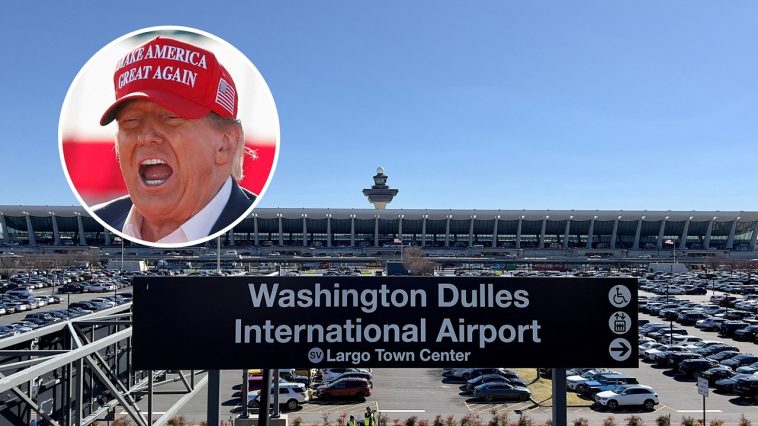This week saw several House Republicans unveil a proposal to rechristen the Dulles International Airport in Virginia as the Donald J. Trump International Airport. The proposal was led by Representative Guy Reschenthaler (R-PA), who in his persuasive words, extolled that during his lifetime, no other president has exhibited the exceptional leadership that the 45th president, Donald J. Trump, did. Although the bill doesn’t seem to be set for deliberation in the House, it signifies a broader ambition among Trump-supporting congressmen to honor the former president as he embarks on securing another presidential term.
This particular proposal has attracted the backing of multiple Republican representatives. These include Representatives Michael Waltz (R-FL), Andy Ogles (R-TN), Chuck Fleischmann (R-TN), Paul Gosar (R-AZ), Barry Moore (R-AL), and Troy Nehls (R-TX). The proposal, if voted into effect, notably declares that, ‘the Washington Dulles International Airport in Virginia shall henceforth be acknowledged as the Donald J. Trump International Airport.’
In accordance with the proposal, any legal documentation, regulation, map, or other official reference to the formerly named airport would be deemed a citation to the newly christened ‘Donald J. Trump International Airport.’ This legislative proposition, while succinct, is unambiguous in its intent to honor the former president, with its two-clause text making this clear.
However, as expected, the proposal has stirred controversy, particularly among Democrats. Democratic Representative Gerry Connolly (D-VA), who represents the home district of the airport, challenged the movement saying, ‘Donald Trump is the subject of 91 felony charges. If Republicans wish to memorialize him, they might more appropriately consider a federal prison.’ District colleague, Representative Don Beyer (D-VA), expressed vehement opposition to the proposed name change.
Rep. Beyer, a representative of a neighboring district, has spoken out, recounting that, ‘One of the initial actions undertaken by Trump upon becoming president was the implementation of a contentious travel restriction, largely seen as discriminatory towards Muslim majority countries. This move disrupted the lives of countless permanent American residents. I personally went to Dulles attempting to provide support for innocent individuals entangled in the ensuing chaos. I vividly recall strained families patiently waiting for detained grandparents for hours.’
Further, Rep. Beyer did not hold back any criticism of his Republican colleagues. He shared, ‘The same Republicans proposing this bill today were difficult to pin down with their non-committal responses when questioned about the suffering induced by Trump’s travel restrictions previously. They perfectly understand that Dulles will not be renamed after Trump. Instead, their true motive lies in currying favor with their influential leader.’
At present, Dulles International Airport takes its identity from John Foster Dulles, a former Secretary of State, who valiantly fought against the Communist threat during the Eisenhower administration. His legacy is steeped in dedication to his nation and his principles and clings tenaciously to the title of this international hub.
There is historic precedence of airports in the DC region being named after Republican presidents. The Ronald Reagan Washington National Airport in Arlington, Virginia stands as solid evidence of the same. If this proposal finds sanction, the tradition would continue with Trump being honored similarly.
Rechristening public infrastructure in the name of a former President is an age-old tribute that affirms their significant contributions to the civic fabric of the nation. This proposal represents a continued testament to this enduring tradition. It demonstrates an abiding desire to honor the era of Trump and his leadership, particularly among conservatives who appreciate his decisive stance on various key issues.
With the proposed legislation, there’s a clear demonstration of support for President Trump among his party peers. Regardless of whether it moves forward in the House, it underscores the profound impact of his presidency and the enduring support he continues to receive within the Republican ranks.
This proposed renaming stands as a potent symbol of the tension inherent within our current political climate. It illuminally encapsulates the dichotomy between Republicans’ conceptualization of Trump’s legacy and Democrats’ very different perspective, creating a dramatic narrative that showcases the inexorable role played by personalities and ideologies in shaping America’s political landscape.
The proposal is symbolic of the Republicans’ ongoing commitment to uphold the legacy of President Donald J. Trump and his undeniable influence on their party and the country as a whole. It is representative of a broader effort to celebrate his contributions, not just as a President, but as a key figure in modern American political history, who left an unmistakable mark on conservative circles.
While the fate of this legislative proposal remains uncertain, it undeniably serves as a testament to the enduring passion and loyalty towards Donald Trump within the Republican party. Moreover, it is a symbolic gesture aimed at etching the legacy of the 45th president into the national narrative, thereby affording him a place of honor and distinction in the annals of American history. Only time will determine if this dedication to the former president, as embodied in the renaming proposal, resonates with the larger American polity.


